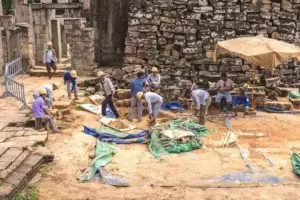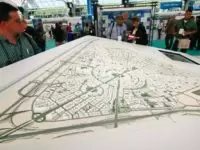
Ethnoarchaeologists study technologically primitive people in today's world to better understand the past.
What Does an Ethnoarchaeologist Do?
Ethnography has been a field of study for centuries, but it was rare that data produced from an ethnographic study was used to understand the past. Examining the technologically primitive was simply a curiosity in and of itself. But all that changed in the 20th century with the availability of cheaper international travel. Now, academics and researchers can study remote societies and acquire more information for a variety of research purposes. It's proven a great area of study in the wider scope of archaeology and anthropology.
Ethnoarchaeology provides a vital niche - the study of remote and technologically primitive people in the present to understand the past. While people are at the centre of ethnographic studies and ethnoarchaeology, it is not just about the individual. Ethnoarchaeology makes contemporary social comparisons between the past of the developed world and the least technologically developed today. People who work in this area examine the beliefs and superstitions, the technologies (and how such technologies are used, produced and processed) and social structures, and the environment. It is a direct historical approach; this means it observes people and processes in the field in order to draw conclusions. In a way, it provides a bridge between archaeology and anthropology where the latter is inadequate for answering the important questions.
Rather than working in labs or offices, ethnoarchaeologists spend most of their time travelling - usually in the developing world, but not always - recording the daily lives and actions of technologically primitive peoples.
RELATED - Archaeology: Examining Its Past and the Future
Where Does an Ethnoarchaeologist Work?
There is no specific data for ethnoarchaeology employment. It is an area of academic study so the data at BLS is likely to be inadequate for this particular niche. The majority are likely to find their career is an academic one. Therefore, you'll find work as a lecturer or researcher at a university or college with a school or department dedicated to archaeology and anthropology. You will spend your time working at the department with the occasional field trip to acquire data as part of an existing study or to begin a new project. Some ethnoarchaeologist research field trips can last for years.
Some may find roles in R&D in the social sciences. This may not involve field trips and could include such commercial applications as marketing. Marketers need to understand what makes people think and act the way they do in order to promote products, services and raise awareness of charities. Commercials and campaigns appeal to different people in different ways. Some ethnoarchaeologists who do not want or are unable to pursue an academic career will find many opportunities in marketing.
What Is the Average Ethnoarchaeologist Salary?
According to 2020 BLS statistics, the median salary for an archaeologist or anthropologist is $66,130. This includes all researchers, excavation employees, technical specialists, project managers and those in teaching positions. There is no specific data for ethnoarchaeology due to its small, niche requirements. However, those in research and teaching positions are likely to see a median salary close to the federal government median of $79,270. The average salary of those working in R&D in social sciences reported an average salary of $59,240 in 2020.*
Ethnoarchaeology Jobs & Job Description
An aspiring ethnoarchaeologist must have a background in both archaeology and anthropology with experience in research and report writing. An ethnoarchaeologist may have the following job duties:
- Collect information about a specific group of people and make judgments through observation, interviews and review of historical documents
- Identify culturally specific beliefs and practices of distinct populations and communities
- Plan and direct research to characterize and compare the economic, demographic, social, linguistic and religious institutions of distinct cultural groups and communities
- Write about and present research findings for a variety of specialized and general audiences
- Teach and mentor undergraduate and graduate students in anthropology and/or archaeology
An ethnoarchaeologist with significant experience may take on an advisory role educating students, stakeholders and the public about the results of their research endeavors. They may:
- Advise government agencies, private organizations and communities regarding proposed programs, plans and policies and their potential impacts on cultural communities
- Explain the origins and physical, social or cultural development of a select group, including cultural traditions, religious beliefs, languages and societies.
What Is the Job Demand for Ethnoarchaeologists?
Similarly, little data exists for this type of job role but it is likely to reflect the wider picture of archaeology and anthropology nationally. The job demand for archeologists and anthropologists is projected to increase by 8 percent between 2020 and 2030.*
What Are the Education Requirements to Become an Ethnoarchaeologist?
High school students should follow a typical route for archaeology and anthropology. Geography, particularly human geography, is now an important part of the study of people and societies of the past. Therefore, students at this level should focus on math, geography and a hard science - biology would be the most helpful, especially when handling physical materials. The ability to identify plant and animal remains is particularly useful in archaeology. Students could also study history and/or sociology where available.
Archaeology is the typical degree path for most students wishing to enter any archaeological niche, though anthropology will also provide some necessary skills. How you tailor your minors will provide the relevant background to study a master's degree. We strongly recommend focusing on minors surrounding environment, sociology, anthropology and geography - as with above, human geography will be essential. As part of your studies, you will be expected to take part in an archaeological field school to learn the methods and techniques. Although your future career as an ethnoarchaeologist is unlikely to include excavation (because your research is of the societies), where possible you should seek projects most relevant to your interests and skills. Geographic Information Systems (GIS) is increasingly vital in this field. Where available, choose this as a minor if it is not part of the degree.
The student should take a master's degree at the very minimum. A master's degree will develop your research, critical thinking, project design and writing skills to an advanced level. Observation and analysis skills are vital to the independent study that goes with these applied projects. Doctorates are certainly advised for those wishing to enter into a career in academic research and teaching.
Ethnoarchaeology - Related Degrees
What Kind Of Societies and Professional Organizations Do Ethnoarchaeologists Have?
There are no dedicated ethnoarchaeology organizations at present due to its niche area. It's more of a tool than an area of study. As an ethnoarchaeologist, you will get relevant information and networking from the following:
- Society for American Archaeology: Despite the name, it's an international body with divisions all over the world, dedicated to studying the archaeology of the Americas. It has more than 7,000 members worldwide
- United Nations Educational, Scientific and Cultural Organization: This is the UN body responsible for promoting international cooperation in knowledge, the sciences and culture. They work to ensure everyone can benefit from the acquisition of knowledge
- Archaeological Institute of America: One of the country's leading organizations, they produce the prestigious journal American Journal of Archaeology
*2020 US Bureau of Labor Statistics salary figures and job growth projections for anthropologists and archeologists reflect national data not school-specific information. Conditions in your area may vary. Data accessed September 2021.





